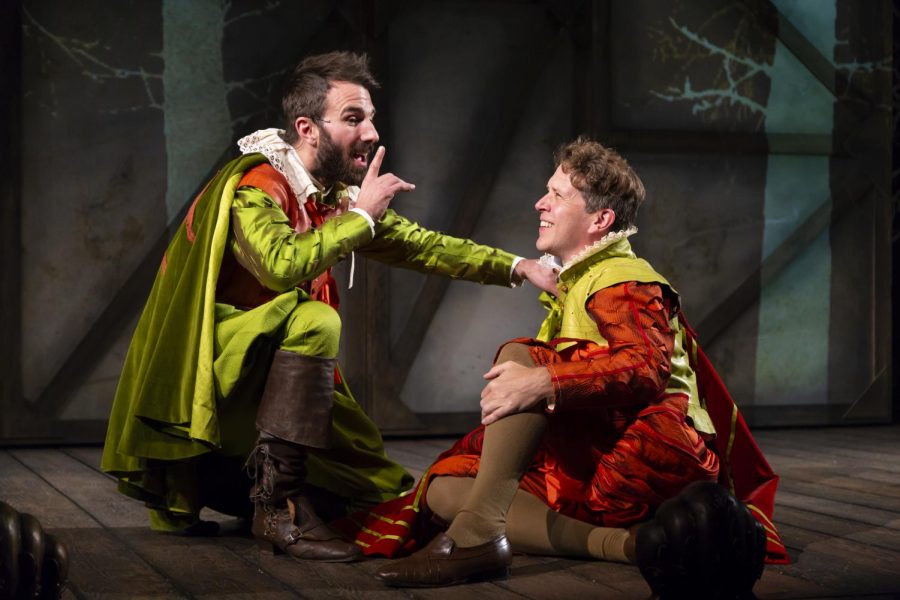Review: ‘Rosencrantz and Guildenstern are Dead’ is a crisis of antiheroes
Photo courtesy T Charles Erickson, Huntington Theatre Company
Alex Hurt (Rosencrantz) and Jeremy Webb (Guildenstern) in the Huntington Theatre Company’s production of “Rosencrantz & Guildenstern Are Dead,” playing Sept. 20 through Oct. 20, 2019 at the Huntington Avenue Theatre.
October 2, 2019
Minor characters take the main stage in the Huntington Theatre Company’s production of “Rosencrantz and Guildenstern are Dead,” and they’re nothing short of absurd.
Playwright Tom Stoppard’s 1966 tragicomedy, set amid William Shakespeare’s late 16th-century tragedy “Hamlet,” begins soon after Hamlet’s mother and uncle send for his friends Rosencrantz and Guildenstern, played by Alex Hurt and Jeremy Webb respectively, to find out what is wrong with him.
The plot of “Hamlet” is simply a backdrop for the crisis of the titular characters, occurring around them as a play on a set they are aware of and cannot escape. The pair are often dazed and unable to remember basic information about themselves or why they’re there as they observe the actions on the stage behind them. With minimal understanding of what’s going on, Rosencrantz and Guildenstern are helplessly whisked into the web of Hamlet’s problems, highlighting the senselessness of human existence.
Stoppard explores a dark side as well, cleverly integrating existentialism into the piece. The characters often contemplate the merits and inevitability of life and death.
“In our experience, most things end in death,” said the Player, an actor portrayed by Will LeBow who delivers wisdom through foreshadowing and ironic punchlines throughout the play.
What makes Rosencrantz and Guildenstern so great is that like most of us, they’re antiheroes. The pair have no established bigger purpose or significance, made evident by their original role in “Hamlet.” Their silliness and disorientation make them seen incompetent, but their conversations often launch into philosophical tangents. In a game they play repeatedly throughout the production, they shout increasingly rhetorical questions at one another, like “Is there a choice?” and “Is there a God?”
Furthermore, they are often mistaken for one another by other people and by each other as the play goes on and confusion heightens. While Rosencrantz appears softer and Guildenstern more assertive, they tend to alternate roles in conversation, causing their identities to blur together.
Stoppard uses the protagonists to question whether it really matters who you are if everyone will eventually pass away.
“Death is not anything,” Guildenstern said. “It’s the absence of presence.”
Stoppard poses the same questions that haunt Rosencrantz and Guildenstern to the audience. With no other goals to explore, they both stumble across these musings in lighthearted conversations and ponder them intensely.
Despite a smooth performance by the main actors, the play moved a little too fast at times, making it hard to keep up as the conversation jumped from being brilliantly self-aware to entirely nonsensical.
The title leaves little to the imagination, so there’s nothing left to do but ride the waves of this dark comedy as it questions life itself.
The Huntington Theatre Company will present “Rosencrantz and Guildenstern” at the Huntington Avenue Theatre through Oct. 20.







